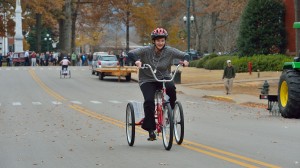
Brandi Hephner LaBanc, UM vice chancellor for student affairs, rides a tricycle in a relay race as part of the RebelWell program.
OXFORD, Miss. – The University of Mississippi has a new fleet of 90 bicycles and tricycles available for faculty, staff and students to use in an effort to encourage both physical activity and the use of alternative modes of transportation on campus.
Using a portion of a $250,000 grant from the Blue Cross Blue Shield of Mississippi Foundation, the university purchased a fleet of 25 bikes and 15 trikes for faculty and staff use. Some 50 more bikes for student use were purchased by UM Parking and Transportation. Another 100 bikes are available for rent.
“We want to encourage people to incorporate physical activity when they can because we’re all short on time,” said Andrea Jekabsons, UM assistant director of employment and training. “That means using a bike to run an errand, or walking, as opposed to jumping in their car or in a departmental golf cart. It’s also just a good way to take a break and reenergize.”
The employee bikes will be designated to university departments. Those departments that have a designated RebelWell wellness champion are given priority. Wellness champions go through three hours of training on general health, proper nutrition and physical activity.
Students can rent bikes for $25 per semester, which includes the cost of repairs. There’s also a bike repair shop next to Kennon Observatory to serve students, faculty and staff who own their own bikes. Those who own bicycles are also asked to register them by printing out a form from the UM Department of Parking and Transportation website.
 Besides promoting healthy habits such as cycling, the UM bike program’s organizers also want to promote alternative forms of transportation. During the semesters, when the traffic is at peak, giving students and employees another way to get around could help alleviate congestion.
Besides promoting healthy habits such as cycling, the UM bike program’s organizers also want to promote alternative forms of transportation. During the semesters, when the traffic is at peak, giving students and employees another way to get around could help alleviate congestion.
“The campus can sometimes be crowded and congested with vehicles, so the bikes offer a timesaving element if you need to travel across campus,” said Wendy Carmean, program coordinator for RebelWell. “If you’re out and about for 15 to 20 minutes, ride a bike and get a little exercise while you work – no need for a car or even a golf cart.”
The weather here is conducive to cycling almost year-round, said Mike Harris, director of parking and transportation services. Bikes are a major part of the university’s overall transportation strategy, he said.
“The Transportation Demand Management strategy is made up of four categories: pedestrians, bicycles, buses and vehicles,” Harris said. “Our goal is to try and reduce certain sections of this as we increase others. If we can increase bicycle use and bus usage, it can help reduce our vehicle traffic. This will help the overall parking situation, along with reducing road congestion.”
The campus bike effort also promotes better environmental stewardship, said Anne McCauley, assistant director of the UM Office of Sustainability.
“The campus bike program promotes active transportation, a key component of a more sustainable and healthy campus,” she said. “By providing departments access to new bikes, we are encouraging the campus community to decrease our dependency on fuel.”